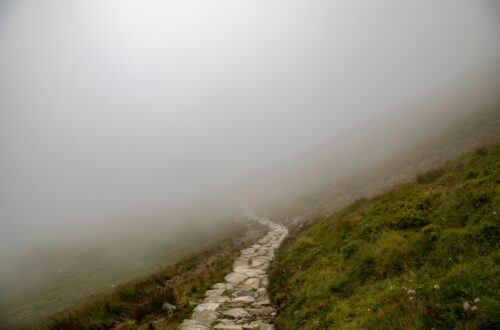When it comes to Christians struggling with pornography, the market is relatively flooded with resources for men. (Still, over 90% of churches have no support for men or women).
This is how it was even decades ago when I, a Christian teenage girl, searched for help for my porn addiction. For years, I thought my consumption of pornography was healthy and even normal. I saw it as a safer alternative to sleeping around and a way for me to express and explore my sexuality while still honoring all of the tenants of purity culture.
My church didn’t talk about pornography, other than vague mentions of “Men, what you are looking at on the computer.” My family didn’t talk about pornography, other than to say people who watched it were sick.
I didn’t personally have a problem with pornography until I tried to stop watching it… and found I couldn’t stop.
That feeling of no longer being in control of my actions and instead being controlled by something else is what led me to search for help.
I couldn’t find anything. As I searched and searched the internet for ways to break free, I found resource after resource for men. Books. Articles. Support Groups. But nothing for women.
That searched introduced a question that would haunt me for a few years.
Am I the only woman in the world who does this?
I’m not the only woman who has asked that question. In fact, it’s a sentiment I’ve heard echoed in nearly every email I have received. Because of the lack of conversation and resources, Christian women who struggle with pornography often feel alone in that struggle.
It seems to be a general rule that men will struggle with pornography. I once read an interview with a college counselor and he said something to the effect of “we just assume that 100% of our male students have an issue with pornography.” Yet, the same is not said for women. In fact, I think if you were to ask many pastors, college counselors, ministry leaders, or youth group leaders, while the whole might assume 100% of men have a problem (which is an unhealthy and unhelpful assumption) they would also assume the number of women with this problem to be zero.
I’ve found this to be the case time and again as I have written and spoken over the past 14 years.
People just assume women don’t have this problem, but that assumption is dangerous.
But where does it come from? Why do we assume porn isn’t a problem for women?
I think the answer is, in part, because we aren’t talking about it. So, in a sense, it is a vicious cycle of circular reasoning. We don’t talk about it so we don’t hear about it, and when we don’t hear anything about it, we assume it isn’t an issue. But when we don’t talk about it, those with the issue don’t feel they can say anything, so we continue hearing nothing and assuming it isn’t a problem.
When I first started writing and sharing my story, even though it was my own lived experience, a number of editors, pastors, and ministry leaders invalidated it. “Women don’t have this problem,” “it’s not like women sit around watching hours of porn,” “we don’t need that kind of discussion corrupting the women in our church.”
I’ve found two common approaches to interpreting what I mean when I tell people I am a Christian woman who used to be addicted to pornography. They either water down what I mean by “addicted” or they assume that when I say “pornography” I’m talking about romance novels and erotica.
While it may seem like these people lack compassion and care, what I’ve actually found over the years is that the silence around women struggling is more in part to lack of awareness.
At the risk of sounding like a feminist, hear me out:
For years, the narrative on pornography has been written by men.
Men have decades of experience explaining why men struggle with pornography. After all, men are visually wired, right? This, by default, has left men also in charge of explaining why or if women struggle with pornography. So, while men are “visually wired” women are more “emotionally wired” so, of course, women aren’t going to struggle with pornography. This is the narrative that informs not only our conversations on pornography but our conversations on other topics like purity and modesty. It’s why men have pancake breakfasts to address pornography while women have ladies’ teas to talk about true beauty and being godly wives.
Men being “visually wired” and “unable to control their urges” is what leads us to rules about skirt length and sleeve width for women. It’s what leads to arguments supporting things like marital rape. It’s what leads to the discounting, disregarding, and even demonizing of female sexual pleasure. I stumbled across an excerpt from an old Christian marriage book written by a woman in which she informed new brides that it was ungodly for them to enjoy sex.
The narrative is flawed and has been from the start.
Ask any young woman and she will tell you that women can absolutely be visually aroused. The shirtless men at the beach? Phew! The pastor in his fitted suit? Mercy me!
Porn wasn’t an issue for men just because “God made men that way” (He didn’t). Porn was an issue primarily for men because men were the only ones with access. As women started gaining independence, working outside of the home, and with the advent of the internet, women started having autonomy and access. And the result is, they also struggle.
The porn idustry has accomodated this too. It is a business, after all, and like any good business, once you get a new audience, you start to market content to them. So, as women began having access to pornography, pornography began making itself accessible and acceptable to women.
We built an entire argument on the wrong foundation, assuming that men struggled with pornography so much because something in them as men made them struggle. Conversely, we assumed that something in women made it so they wouldn’t struggle.
The reality is men and women struggle with pornography because there’s something in both of us that was created to enjoy sex.
But changing a long-standing narrative isn’t as easy as flipping a switch. It takes a lot of convincing. It takes people speaking up and sharing their stories and being willing to stick with it and talk about this.
The reason there is a lack of resources isn’t because people don’t care. It’s because people don’t realize how big this issue is.
It’s because resources for women fight against a decades-long narrative that this isn’t an issue for women. It’s because the women who struggle and need these resources often feel alone and trapped in shame and silence. They desperately need the help but are too afraid to ask.
I’ve told several pastors, podcasters, and radio hosts that if people realized the magnitude of the problem heading their way, they would be scrambling to do something about it. But the reality is, we can’t often see problems until they are swallowing us. In a world where we are surrounded by brokenness and evil, where we are distracted by politics and trends, we can be blind to the real enemies sneaking into our ranks and destroying us from the inside out.
Thankfully, the conversation is changing. I have seen it even in the years I’ve been doing this.
As more women are willing to step up and share their stories, there are a growing number of books and resources on the market for women who struggle with pornography. My book, Quenched, released this January. There are groups and influencers on various social media platforms speaking out on the issue. Ministries that originally catered only to men now have material for women as well. Authors are beginning to talk about pornography as something both men and women struggle with (because it is).
All of this serves to raise awareness and break down the wall of shame and silence. It starts rewriting the narrative on female sexual expression, even in the church. As that happens, more and more women will be comfortable coming forward to share their story. As that happens, pastors, ministry leaders, editors, publishers, and more will start pursuing resources to help.
In other words, if you are a Christian woman struggling with pornography and looking for resources, be encouraged. You are not alone. The tide is changing and more help is coming.






